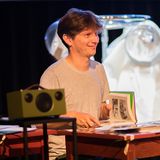Everything around us has been designed: the clothes we wear, the buildings we live and work in, even the systems that deliver our food and mobility. Unfortunately, most things have been designed to fit the linear model, where life cycles are short and materials are nearly impossible to recover. How can we do this differently? In this first collaboration between What Design Can Do and Pakhuis de Zwijger we want to take a closer look at how we can reframe and reimagine the way we design.
During these evenings we will give the stage to exciting, innovative, provocative designers who do things differently. Designers who restore, & reimagine, reduce & refuse, reframe & reconnect, recycle & repair.
About the speakers
Borre Akkersdijk is a textile designer who discovered his passion for textiles during his studies at the Design Academy in Eindhoven. After working at Studio Edelkoort in Paris for three years, he started his own company. In 2015, he founded Byborre, together with Arnoud Haverlag, where they specialised in knitting fabrics with unique textures, with a focus on innovation and sustainability. Over the past six years, Byborre has grown into a company with 42 employees, with partnerships with major international brands such as BMW, Rapha and Natuzzi. In addition, Byborre has its own collection that is available worldwide in exclusive stores.
Priyanka Bista is a Nepali-Canadian designer and a multispecies designer, educator, and researcher. Her decade-long work lies at the intersection of participatory design and biodiversity conservation. In collaboration with indigenous communities across the Eastern Region of Nepal, she co-founded the innovative ‘Vertical University’ project, which taps into the learning potential of Nepal’s vertical gradient, spanning from a 67-meter elevation in Koshi Tappu to the majestic Mount Kanchenjunga, the third tallest peak in the world, at 8,586 meters.
Edwin Gardner is futurologist and co-founder of Studio Monnik and futurology at media-platform De Chrononauten. He researches historical trends and develops intellectual frameworks that we use to craft credible future scenarios. His work helps governments and companies to get a better grasp of our rapidly changing world. Studio Monnik is both a strategic think tank and a creative studio.
Ece Tan is a speculative designer and design researcher. By presenting alternative narratives, she aims to critically engage viewers with possible future scenarios and to create catalysts for debate on the implications of the choices we make today.











